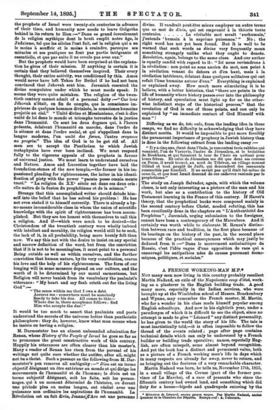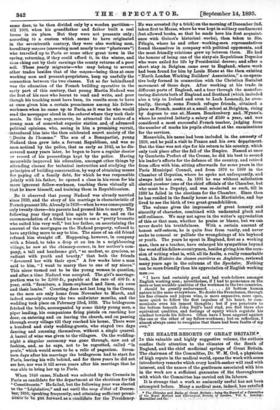A FRENCH WORKING-MAN M.P.*
NOT many men now living in this country probably recollect Martin Nadaud, an exile of the Napoleonic coup d'itat, work- ing as a plasterer in the English building trade. A good
many more, especially in the Indian services, who were brought up at the Wimbledon school of Messrs. Brackenbury and Wynne, may remember the French master, M. Martin, who for a wonder in his class made himself popular among English schoolboys. And now in his eightieth year, under a pseudonym of which it is difficult to see the object, since no attempt is made to give "Leonard " any distinct personality, he has given to the world the story of his life. The tale is most inartistically told,—it is often impossible to follow the thread of the events related ; page after page contains technical details which can only be understood by a French builder or building trade operative; names, especially Eng- lish, are often misspelt, some almost beyond recognition. And yet the book has a distinct and permanent value, both as a picture of a French working man's life in days which in many respects are already far away, never to return, and as bringing out the features of a very remarkable character.
Martin Nadaud was born, he tells us, November 17th, 1815, in a small village of the Creuse (part of the former pro- vince of La Marche), of a race of peasants who since the fifteenth century had owned land, and something which did duty for a house—bipeds and quadrupeds entering by the • Memoirs, de Leonard. ancien garpn rnagon. Par Martin Nadal:id. aacien Questeur de la Charabre des Deputes. Bourgaueur : A. Laboueir.. same door, to be then divided only by a wooden partition— till 1808, when his grandfather and father built a real house in its place. But they were not peasants only ; according to a custom which seems to have originated in the seventeenth century, they were also working men, hereditary ?flacons (answering most nearly to our " plasterers") who travelled up to Paris or some other great town in the spring, returning, if they could afford it, in the winter, and i.Lus eking out by their earnings the scanty returns of a poor soil. These yearly migrants—who may belong to several other trades besides that of the ntacon—being thus at once working men and peasant-proprietors, keep up usefully the connection between the two classes. Yet so far behindhand was the education of the French building operative in the early part of this century, that young Martin Nadaud was the first of his race who learnt to read and write, and poor though his teaching must have been, its results seem to have at once given him a certain prominence among his fellow- workmen when he came up to Paris, as it was he who would read the newspaper aloud in the cabaret where they took their meals. In this way, moreover, he attracted the notice of a young man of somewhat superior station and of advanced political opinions, who, seeing in him a promising recruit, -introduced him into the then celebrated secret society of the Droits de l'homme." The son of a Bonapartist, young Nadaud thus grew into a fervent Republican, and was so soon noticed by the police, that as early as 1842, as he dis- covered many years later, he began to have a regular dossier or record of his proceedings kept by the police. Having meanwhile improved his education, amongst other things by attending classes for technical instruction and studying the principles of building construction, by way of obtaining means for paying off a family debt, for which he was responsible jointly with his father, he opened a class in his room for his more ignorant fellow-workmen, teaching them virtually all that he knew himself, and training them in Republicanism.
Be it observed that young Nadaud was already married since 1839, and the story of his marriage is characteristic of French peasant life. Already in 1838—when be was consequently only twenty-three—his parents had pressed him to marry. The following year they urged him again to do so, and on the recommendation of a friend he went to see a "pretty brunette who suited him very well," but her father, on ascertaining the amount of the mortgages on the Nadaud property, refused to have anything more to say to him. The niece of an old friend refused him straight off. Happening, however, in company with a friend, to take a drop at an inn in a neighbouring village, he saw at the chimney-corner, in her mother's com- pany, a tall and handsome girl, " so modest, so gracious, so radiant with youth and beauty," that both the friends " devoured her with their eyes." A few weeks later a man said to him, " I want to marry thee to one of my nieces." This niece turned out to be the young woman in question, and after a time Nadaud was accepted. The girl's marriage- portion was to be 3,000 fr., payable at the rate of 400 fr. a year, with "furniture, a linen-cupboard and linen, six ewes and their lambs." Courting does not last long in the Creuse, as the men are only home from November to March, and indeed scarcely outstay the two midwinter months, and the wedding took place on February 23rd, 1839. The bridegroom fetched the bride, accompanied by some thirty young men, a piper leading, his companions firing pistols on reaching her door, on entering and on leaving the church, and on passing through every village till they reached his house, There were a hundred and sixty wedding-guests, who stayed two days dancing and amusing themselves, without a single quarrel. A barrel of wine was given to the villagers. On the wedding- night a singular ceremony was gone through, now out of fashion, and, as he says, not to be regretted, called "la poule," which would seem to be a relic of paganism. Seven- teen days after his marriage the bridegroom had to start for Paris, leaving his wife behind, and for three years he did not see her, nor was it till seven years after his marriage that he was able to bring her up to Paris.
When 1848 came, Nadaud was selected by the Creusois in Paris as candidate for the department at the elections for the "Constituents." He failed, but the following year was elected to the "Legislative," and sat until the coup d'gtat of Decem- ber, 1851, speaking frequently, and attaining sufficient promi- nence to be put forward as a candidate for the Presidency.
He was arrested (by a trick) on the morning of December 2nd, taken first to Mazas, where he was kept in solitary confinement (but allowed books, so that he made here his first acquaint- ance with Guizot's historical works), then taken to Ste.
Pelagie, where he and other working-men representatives found themselves in company with political opponents, and the most friendly relations grew up between them. He had the honour of being one of the sixty-six Republican Deputies who were exiled for life by Presidential decree; and after a short stay in Belgium came over to England, where work had been found for him by Louis Blanc at the then existing "North London Working Builders' Association," a co-opera- tive body formed in connection with the Christian Socialist movement of those days. After working at his trade in different parts of England, and a tour through the manufac- turing districts both of England and Scotland (which included also a trip to Ireland and even to Loch Lomond), he even- tually, through some French refugee friends, obtained a place as French master at a small school at Brighton, rising by degrees to one at Messrs. Brackenbury and Wynne's, where he received latterly a salary of £160 a year, and was considered a most successful French teacher, judging from the number of marks his pupils obtained at the examinations for the services.
Meanwhile, his name had been included in the amnesty of 1859, and he paid a visit to France and his own department. But the time was not ripe for his return to his country, which only took place after the fall of the Empire. Named at once by Gambetta Prefect of the Creuse, he did his best to second
his leader's efforts for the defence of the country, and retired from office with him, sitting afterwards for some years in the Paris Municipal Council, and from 1876 to 1889 in the Chamber of Deputies, where he spoke not unfrequently, and always held his own. In 1881 he was without solicitation elected questeur (one of the chief officials of the Chamber, but who must be a Deputy), and was re-elected as such, till in 1889 he failed in the elections for the Chamber. Since then he has resided in the family house at La Martineche, and has
lived to see the birth of two great-grandchildren.
The volume gives the impression of great honesty and sincerity of character, combined with undaunted pluck and self-reliance. We may not agree in the writer's appreciation of this or that man, whether he praise or blame, but we can never doubt his truthfulness. With a certain amount of honest self-esteem, he is quite free from vanity, and never seeks to conceal or palliate the wrongdoings of his boyhood or youth. The years he spent in England, first as a working man, then as a teacher, have enlarged his sympathies beyond the wont of his fellow-countrymen, besides giving him the occa-
sion of writing what is, with all its faults, a really remarkable book, his Histoire des classes ouvrieres en Angleterre, reviewed many years ago in the columns of the Spectator. Nothing can be more friendly than his appreciation of English working men:— "I have had certainly good and bad work-fellows amongst English working men ; nevertheless, if I had to pronounce on the more or less sociable qualities of the workmen in the two countries, I should be greatly embarrassed At bottom human nature is the same everywhere. No doubt the Frenchman, through his fine climate and joyous wine, is more expansive, more open, more quick to follow the first impulses of his heart, to com- municate even his inmost thoughts ; but if you penetrate to the bottom beneath John Bull's hard rind, you find there also equivalent qualities, and feelings of equity which regulate his conduct towards his fellows. Often have I been angered against the one or the other of my fellow-workmen ; but on reflection, I almost always came to recognise that there had been faults of my own."



































 Previous page
Previous page